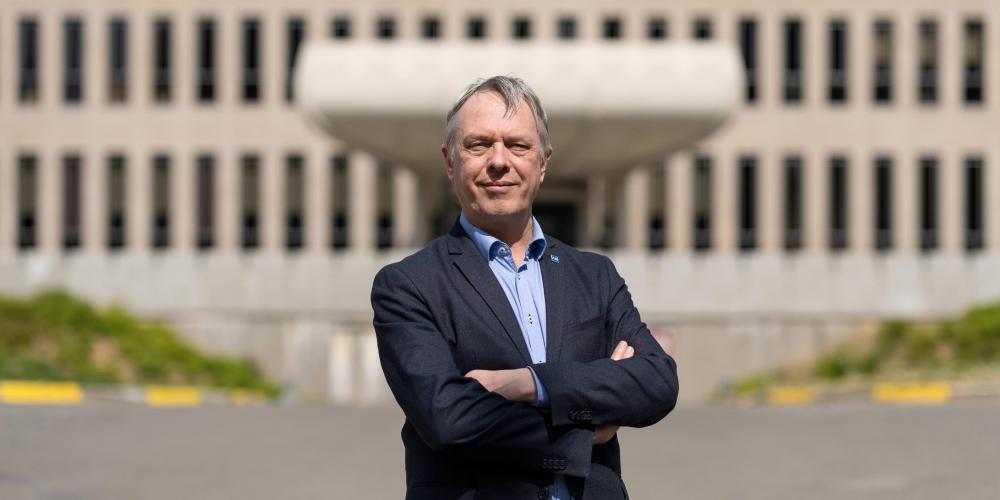
It’s hard for me to grasp how someone who refuses to fully address the widespread child abuse within the Church is being given an honorary platform." These words come from VUB Rector Jan Danckaert, and the honorary platform is being granted by KU Leuven.
Let us briefly outline the background to this accusation. On 20th September, Jan Danckaert made the front page of De Morgen with his interview discussing the growing religious influence on universities. On the 23rd, the KU Leuven rector felt compelled to respond in an op-ed, stating, "You can’t champion diversity and inclusion and then reject them the moment they take on religious aspects." Two days later, Danckaert countered, writing, "Isn’t this the perfect moment to put the separation between religion and universities on the agenda?"
Here is the full opinion piece (in Dutch) from Jan Danckaert in De Morgen, accompanied by a photo of a waving pope.
KU Leuven Rector Luc Sels laments that I raise concerns about the increasing religious influence on universities and advocate treating religion as a private matter (DM 23/9). According to him, the VUB promotes freedom, while KU Leuven prioritises connectedness. He underscores diversity and inclusion as part of KU Leuven’s approach—providing burkinis in swimming classes, inviting other faiths to the Catholic opening mass.
Let’s be clear: diversity and inclusion have always been core values at the VUB. My predecessor, Caroline Pauwels, firmly established that. We embrace the diverse identities and backgrounds of our students, but we choose to facilitate this within a shared, secular framework. Statistics show that the VUB boasts a far more diverse student body than most other higher education institutions. We’re also open to transparently sharing those numbers and our approach. Could it be that a secular framework is more welcoming than crucifixes in lecture halls?
"The way religious traditions often clash with human rights is a matter of concern to us."
Religion is, of course, a significant part of many people’s identities. Tradition offers structure, but what happens when religious communities too overtly celebrate their identity on campus? Does this encourage retreat into one’s own group, into a safe space, or does it promote the openness and exchange essential in a diverse society? At the VUB, we take a different approach. Our university is a "brave space," where free thought and speech are protected by shared agreements.
Emphasising religious group identities can sometimes lead to behaviours that threaten freedom and connectedness. A few examples: a female student pressured by her own ethnic-cultural community to wear religious clothing, or teaching staff threatened because their curriculum clashes with religious beliefs. At the VUB, we safeguard freedom of choice within an open academic environment.
The way religious traditions often clash with human rights is a matter of concern to us. The Catholic Church still considers homosexuality a sin. How can we, as a society, continue to tolerate such views, especially when they contribute to discrimination and even the death penalty, as is the case in some African countries?
"When it comes to research, a separation between religion and university is essential."
The unequal position of women within the Catholic Church also raises questions. Women remain excluded from the priesthood and play a marginal role in the Church hierarchy. While women elsewhere gain equal rights, the Church clings to outdated traditions. Shouldn’t we be asking how this gap between Church doctrine and social progress can continue to exist?
When it comes to research, a separation between religion and university is essential. The VUB is a global leader in in-vitro fertilisation (IVF), and many people owe their very existence to our pioneering techniques. Both the VUB and KU Leuven were at the forefront of IVF in 1982, but at KU Leuven, researchers were held back by religious sensitivities. This was acknowledged by the Leuven university, especially when the Pope banned IVF in 1987. What might have happened if those religious restrictions had also hindered the VUB?
And now, with the current Pope invited to kick off KU Leuven’s jubilee year, isn’t this the perfect moment to put the separation between religion and university on the agenda? It’s hard for me to comprehend how someone who refuses to fully address widespread child abuse within the Church is being given an honorary platform. A few apologies and a couple of minutes of speaking time per victim won’t change that. How respectful must one be towards a faith that actively discriminates against women and LGBTQ+ individuals?
For the VUB, there is no reason to celebrate, and we will not attend the papal festivities. We continue to stand for the separation between religion and the public sphere, precisely to enable freedom and equality.
I want to reassure my colleague Luc Sels. At the VUB, we welcome everyone and provide equal opportunities to all. An open, secular campus environment guarantees both freedom of self-determination and connectedness across a variety of identities. And perhaps it safeguards the most important academic value of all: the freedom to arrive at new insights.*
*This is a machine translation. We apologise for any inaccuracies.